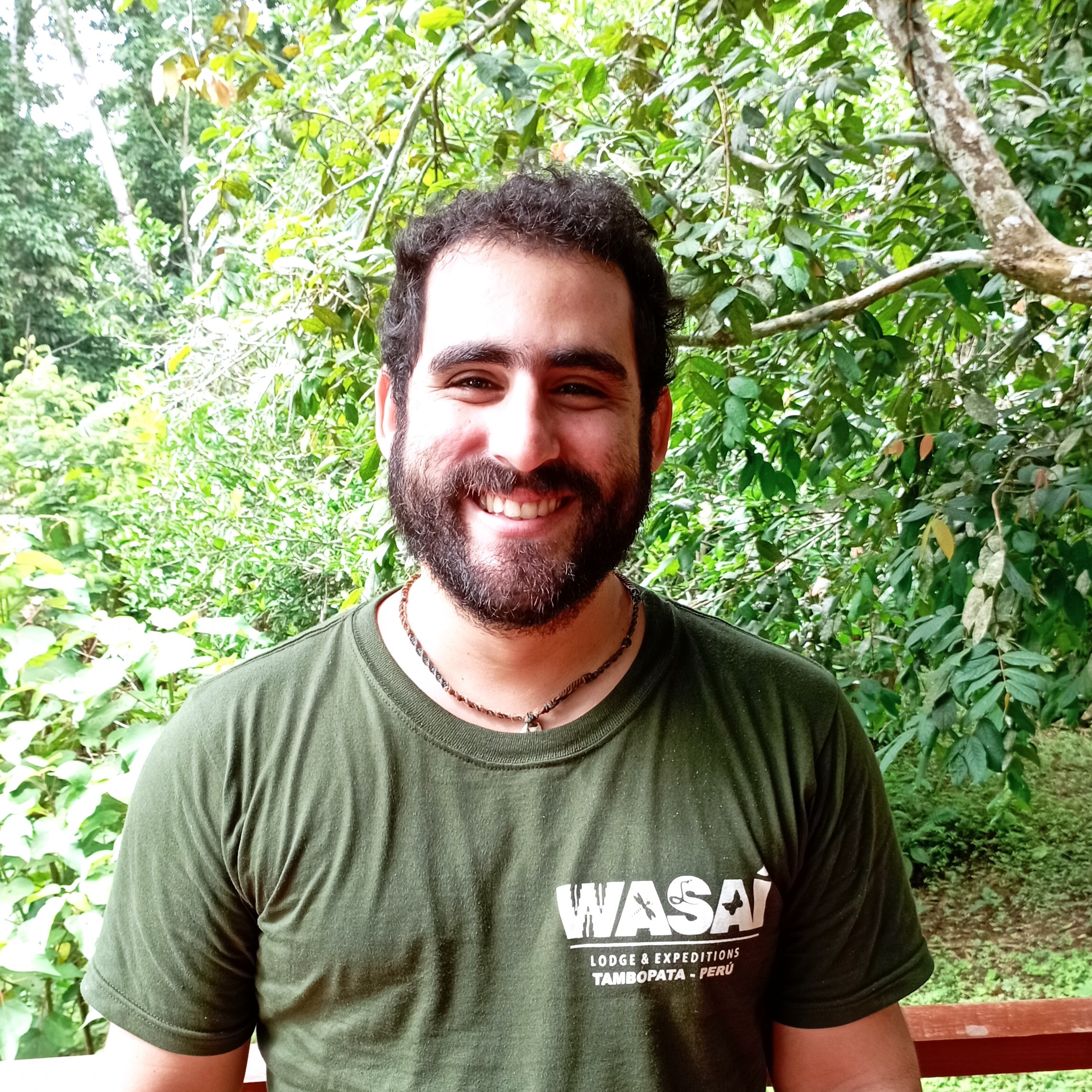Have the chance to support a local conservation program near Puerto Maldonado and make your trip to this part of Peru even more significant!
Come and discover unique landscapes in the Tambopata National Reserve, and have the chance to see native flora and fauna. This experience includes visiting two of the most wonderful sceneries in the area: the Colpa de guacamayos Chuncho (a meeting point where macaws and other bird species feed from the clay of a ravine) and Lake Sandoval… Can this experience get any better?
And, if you want to discover other similar experiences in this part of Peru, we recommend having a look at our tours in the regions of Manu and Tambopata. Or, if you are unsure of where exactly you want to go yet, just have a look at all of our tours and activities in the Peruvian Amazon.
After picking you up at the airport or the bus station of Puerto Maldonado (make sure to arrive before to be able to take part in this tour), you will be taken straight to the beautiful Ecolodge and then to the local port (40 minutes ride). And here, the adventure begins.
Throughout 20 minutes you will have a glimpse of some of the treasures the jungle can offer you. We will navigate to the lodge through the biodiverse Tambopata River (home to capibaras -the largest rodents in the world-, caimans, and other species). Once arrived at the lodge, you will receive a brief explanation of the trip while enjoying delicious local fruits and beverages.
And the adventure continues. You get the chance to go on a night walk through the tropical forest. Prepare to get involved in this atmosphere and be surrounded by the darkness and different sounds of the Amazon. You will have the chance to hear and see different insects, bats, amphibians, and even some bigger mammals if you are lucky.
On the second day, monkeys howling will wake you up. At dawn, you will start a 25-minute journey upriver to the El Chuncho, where the Colpa de Guacamayos is located. While you have breakfast, you will witness the magical moment in which hundreds of birds arrive at the Colpa to feed on the mud and clay of the ravine.
Hereafter we will start the return towards the lodge on the Tambopata River where you will take a short break. You can rest, go kayaking and ziplining, or take a bath in the Tambopata River during your free time. After lunch, you will go on an ethnobotanical walk, where you will roam around the rainforest, to learn about the area’s medicinal plants. You will see different species of giant trees.
And the day is not over until you went looking for caimans along the banks of the Tambopata River. After a long but satisfying day, you will again sleep in the same lodge as on day 1.
Although on day 3 you will start your return trip to Puerto Maldonado, the experience is not over yet.
You will visit Lake Sandoval, located at the opposite end of the Tambopata National Reserve, in the afternoon. The lake is home to the endangered Giant Otters, massive 10-foot-long Black Caimans, and Paiche, one of the largest-scale freshwater fish in the world. Here, you can also see some of the most odd birds in the area, such as the Hoatzin and the Anhinga.
Lake Sandoval was formed generations ago by the changing waters of the local rivers, and to get there you will navigate the Madre de Dios River for 30 minutes and then walk through the forest.
Before nightfall, you will embark on the boat back to the city and you will experience the river nightlife under a sky full of stars. Once we arrive at the Ecolodge (this time located in the city of Puerto Maldonado), you will have a farewell meal.
It’s the last day of the experience. Wake up early and enjoy your breakfast, because after that you’ll participate in a 2-hour workshop in the Cocoa Center, where you’ll be taught how to prepare chocolate and receive a handmade chocolate bar as a farewell gift. Here, you’ll see different cocoa fruits and how they are processed, and you will have the opportunity to taste several cocoa-based products.
At the end of your experience, you will be transferred back to the airport or the bus station to make your way home or to your next destination.

The Tambopata National Reserve has been especially vulnerable since the construction of the Interoceanic Highway in 2011. Tourism provides an economic alternative to people in the area that has a much lesser impact on the environment than other activities such as (illegal) logging, mining, farming, etc.
The lodge you will visit on this trip is located within the buffer zone of the Tambopata National Reserve, surrounded by the approximately 3,000-hectare conservation concession, close to the Bahuaja Sonene National Park. A portion of the receipts coming from your booking goes into the protection and the research projects of the area. In 2022, the German NGO Wilderness International partnered up with the lodge and is now helping to protect the area!
All the facilities are an example of local architecture and were built with materials from the area. It is a unique experience, helping to understand the natural surroundings better, as well as the importance of keeping the area protected for generations to come.
This tour is not very demanding, However, please keep in mind that the weather conditions in the jungle are not what most of us are used to: it gets hot and very humid and mosquitos love it here. So, don’t forget to stay hydrated, wear a hat or a cap and use insect repellent. Feel free to look at our general packing list for the jungle.
While navigating through the rivers near the Tambopata Natural Reserve you must be prepared for hot and humid conditions, which are more or less the rule. Still, rainy days can lower the temperatures quite a lot, or extraordinary events called “friaje” or Antarctic winds could ruin your plans of sweating the hell out of you.
Find more info about climates in Peru in our blog “Best Time to Travel to Peru“.
Passengers should carry preferably only a backpack for the first two days in the jungle lodge. The rest will remain at the hotel in Puerto Maldonado, where you will stay on the third night and then be able to retrieve your luggage.
Visit a travel doctor who can give you professional advice on what vaccinations may be necessary. If you go into the Amazon jungle, a yellow fever injection is obligatory and malaria recommended as well as a shot for the common flu might be requested by the local authorities.
All the facilities are an example of local architecture and were built with materials from the area. They are very well equipped and allows you to get a real jungle experience here, which is highly interesting.
The tour operates all year round except for Christmas (24th and 25th December). Also, we recommend you avoid traveling during the rainy season (December to March) in the area.
The use of drones is possible but restricted. In the lodge, it is possible to fly drones, but with prior authorization from the administrator, analyzing case by case. During the visit to the Reserve, the use of drones is terminally prohibited.
For questions about booking a tour, prices, preparation for your trip, health and safety or other themes, please check our Frequently Asked Questions page. If you can’t find your question & answer, email us and we’ll add it!

Alvaro was born in Peru and studied Tourism and Business. His parents, Mario and Abigail founded the lodge around the time he was born and they made it their life project, putting in a lot of work and passion. Now, they are retiring and leaving it in the hands of the next generation. Alvaro is more than happy and proud to continue their work.
He left his town to go study in Lima when he was younger, but he always wanted to come back. Chiefly because he wanted to work in the jungle, and help with the conservation of this area. He says some of the most beautiful memories he has are the ones from the jungle during his childhood years. Consequently, he is always excited to show the area to more people so they create their memories too.
“…when you are visiting a place as pristine as the Amazon rainforest you have to do everything you can to lessen the impact of your visit and help conserve the forest.” – Alvaro Troncoso